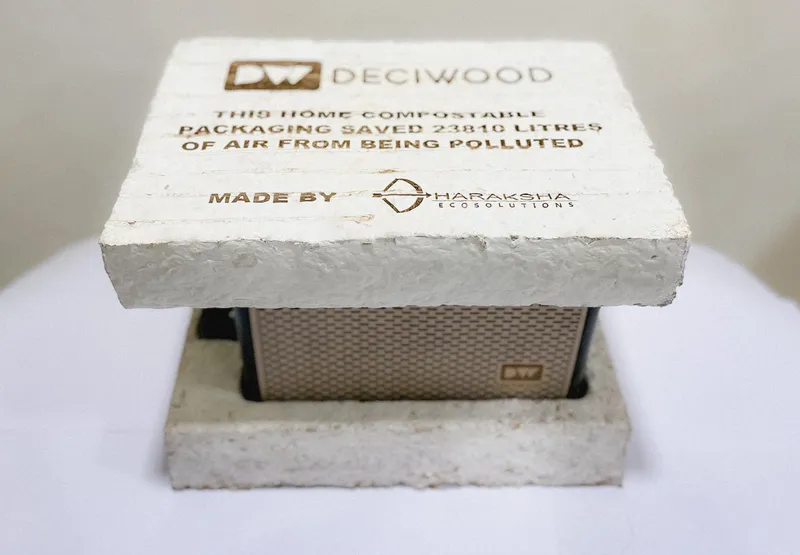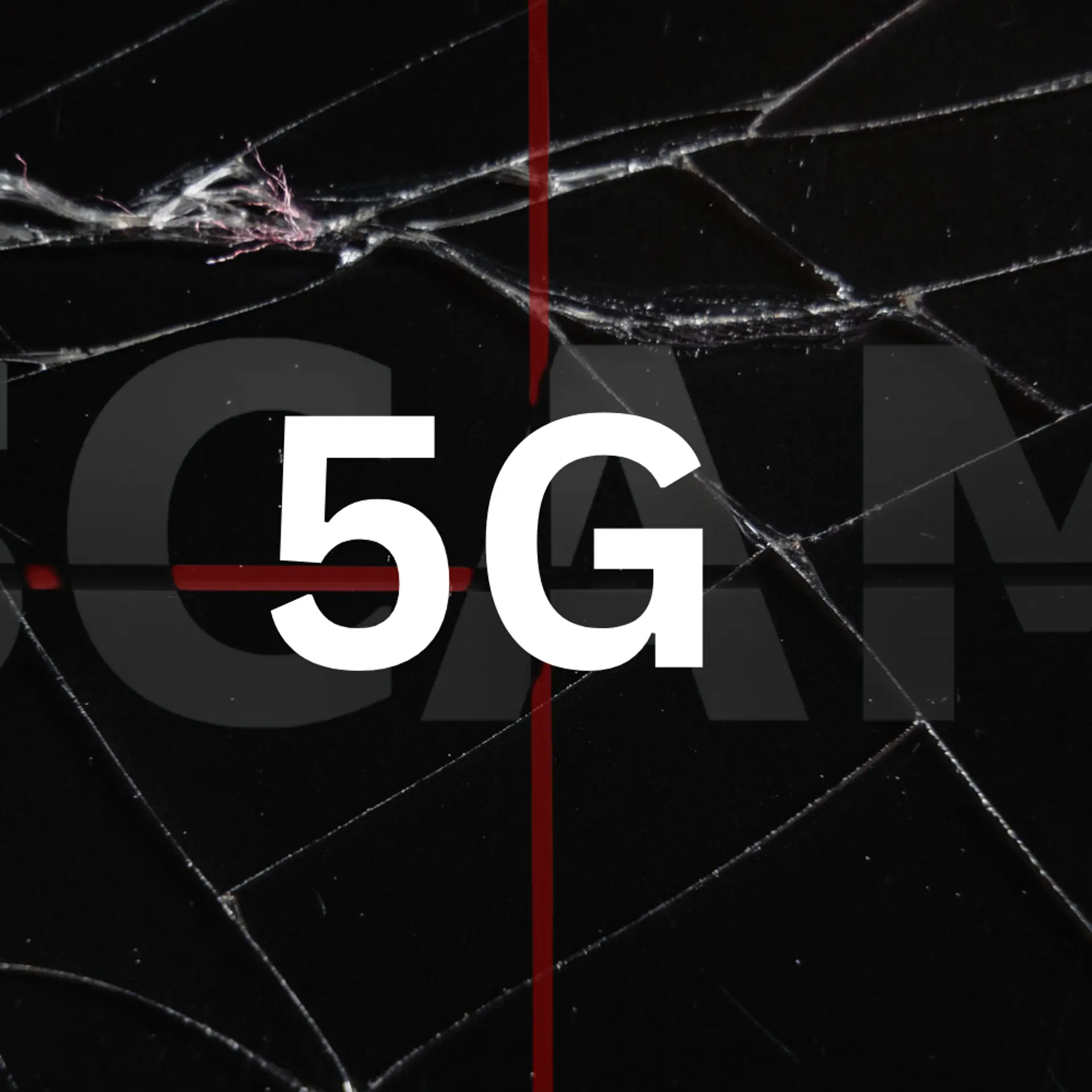Faridabad-based startup Dharaksha is converting crop residue into sustainable packaging
Founded in 2020, Dharaksha Ecosolutions sources paddy stubble from farmers and converts it into biodegradable packaging material.
There has been a growing demand for alternative packaging solutions in the country due to environmental sustainability concerns and the need to reduce plastic waste. This has led to several alternative packaging solutions to gain traction in the packaging industry.
While biodegradable packaging materials are becoming increasingly prevalent, compostable packaging materials, derived from renewable sources like plant fibres, are designed to break down into compost, offering an environmentally-friendly option for packaging various products.
To cater to this demand, Anand Bodh and Arpit Dhupar founded in 2020. The Faridabad-based B2B startup converts paddy straw stubble into biodegradable packaging material.
“We want to eliminate the sources of pollution and replace them with sustainable alternatives. Access to clean air should be everyone’s right, not the privilege of the rich,” says Dhupar.
Bodh and Dhupar were roommates during their BTech. Having known each other and collaborated on several projects for over 13 years, the duo decided to combine their skills to create a product that addresses a significant environmental issue.
According to a report by the Punjab Pollution Control Department, a total of 650 field fire incidents were reported between September and October 2022, double the number of cases recorded during the same period in 2021.
“Due to lack of viable alternatives, farmers end up burning stubble to prepare their land for the next harvest season. What if there was an economically viable solution that could help avoid stubble burning by providing farmers with an alternative method to dispose of stubble? This was the genesis for Dharaksha,” the co-founders tell YourStory.
According to them, Dharaksha is made of two Hindi root words—"Dhara” meaning earth, and "Raksha" meaning saving, which translates to saving the earth from pollution.
Biodegradable packaging
Dharaksha uses mycelium, a mushroom root, to decompose paddy straw and transform them into packaging materials.
For this, it has cultured a mushroom species which uses stubble waste as its food. It is an internally trained strain and hence multiplied internally using biotechnology.
“We do not procure the mushroom strain from the market as the commercially available strains do not have the required qualities of mycelium,” explains Dhupar.
“These materials are made from nature, which is at the core of what we do. We don’t manufacture our products, we grow them,” he adds.
Dharaksha’s packaging materials can decompose in 60 days in normal soil and have a shelf life of more than three years, thus making them an eco-friendly replacement for plastic and thermocol.

Dharaksha’s disposable packaging
The products are suitable for secondary packaging, i.e., packaging that goes between cardboard boxes and the item that needs to be saved during transit. The startup also specialises in custom design.
The packaging materials do not absorb moisture and are thermal resistant, fire retardant, water resistant, and have anti-static properties.
The startup plans to create thin-film plastics out of metabolites generated by the mushrooms, which can replace MDF wood and create a replacement for plastic bags using these films.
Procuring residue
Dharaksha procures stubble from the farmers via a network of aggregators who do the bailing work. Once bailed, the material can be transported in a cost-efficient manner.
The raw material is then chopped, steamed, and processed, which takes up to 10 days to be converted into packaging.
"We are procuring the stubble from districts in Punjab and Haryana within a 200 km radius. Basically, our efforts are to procure from the epicentres where crop burning is most prevalent. Last year, during the season, we procured around 750 tonnes from over 250 acres of land,” Dhupar says.
Dharaksha’s aim is to cut down on stubble waste burning by 40% in the next six to seven years.
Currently, it has a 50-member team in manufacturing, including the manufacturing task force, of which 40% are female employees.
The startup says it compensates both farmers and aggregators.
Business model
The founders initially invested Rs 45 lakh from their personal savings to bootstrap the startup.
The company has a per-piece volumetric price, which depends on the shape and size of the products to be packed.
For instance, a small pot (6-inch size) that can be used to plant a small plant costs around Rs 30. A typical glass jar packaging costs around Rs 10 and can go up to Rs 250 for large pieces.
Dharaksha can currently manufacture 20,000 pieces per month, and plans to scale up 5X in the next four months and 10X by the end of this year.
Dhupar adds, “We would be stepping into distributed and franchise manufacturing, setting up 200–250 odd plants all over India, and trying to curb over 23 million tonnes of stubble waste.”
The founders refused to disclose revenue numbers at the moment.
Dharaksha works with brands such as , BioQ, Fyllo, Kyari, Son of Soil, Bonomi, , and , among. Its clients range from white goods companies and FMCG, to pottery companies.
The startup primarily competes with local players that make thermocol, paper, and plastic packaging. It also competes with US-based Ecovative, which provides sustainable alternatives to plastics and polystyrene foams for packaging.
What next?
According to Precedence Research, the global sustainable packaging market was valued at $101.49 billion in 2022 and is projected to hit around $211.51 billion by 2032, growing at a CAGR of 7.62% from 2023 to 2032.
The startup has raised funding from a host of investors, including Nithin Kamath of , Anshuman Bapna (ex-CPO, ), and IIMB, among other angels.
"The investment space in India is still evolving, and even investors are learning about spaces other than IT and SaaS. So, building biotech or manufacturing companies still requires a lot of hustling to attract the right capital," the founders profess while talking about the challenges.
Dharaksha is currently in talks with new investors to raise Rs 16 crore. It is also looking for brand partnerships to set up the consumer goods items. Dhupar says, “We want to stay as a material science company and want to be at the forefront of innovating new materials and commercialising them.”
“We also want to collaborate with other brands and companies that can help us grow the story and show how much pollution is decreasing with the help of our product. We are happy to be in the background,” he adds.
(The story was updated to change the brand name from Carry to Kyari)
Edited by Megha Reddy








